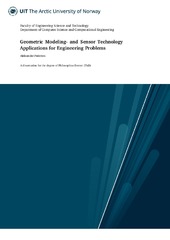| dc.contributor.advisor | Myhr, Anne Ingeborg | |
| dc.contributor.author | Gillund, Frøydis | |
| dc.date.accessioned | 2011-05-12T14:07:11Z | |
| dc.date.available | 2011-05-12T14:07:11Z | |
| dc.date.issued | 2011-02-25 | |
| dc.description.abstract | Inspired by precautionary and participatory approaches to risk governance of novel technologies, this thesis concerns how to acknowledge and handle scientific uncertainties in policy-relevant science. I have addressed this topic by mapping perspectives on uncertainties, benefits and concerns related to the use of modern biotechnology in aquaculture, among scientists, policy advisors and other impacted parties. More specifically, I have applied (i) the Walker and Harremoës uncertainty framework to identify uncertainties associated with DNA vaccination of fish, (ii) the Q-methodology to explore scientists’ perspective on the deliberate release of GM crops and (iii) Multicriteria Mapping to evaluate alternative feed resources (including GM feed) for farmed salmon. Based on the insights I have achieved from conducting these studies, I recognise four strategies as particularly important in order to facilitate precaution and participation, and thereby deal more appropriately with scientific uncertainties in policy-relevant science. Identifying a broader range of uncertainties is a necessary first step in order to deal more appropriately with uncertainties in policy-relevant science. Scientific uncertainties have traditionally been conceived as and handled purely quantitatively. A precautionary approach implies recognition of a broader range of uncertainties such as ambiguity, indeterminacy and ignorance, which are not necessarily reduced with more research. Promoting reflection and communication about uncertainties may improve the quality of policy-relevant science as this helps to clarify the basis for policy recommendations. Moreover, it may contribute to social learning and stimulate changes in scientists’ way of thinking and acting that may further enhance precautionary and participatory approaches. Facilitating deliberation and participation of impacted parties may contribute to a broader range of perspectives and uncertainties being addressed in decision-making processes, and, hence, better management of complex problems. Maintaining plurality in perspectives and policy options may strengthen our ability to adapt to changing and uncertain future conditions, and ultimately lead to the identification of more sustainable pathways. | en |
| dc.description.doctoraltype | ph.d. | en |
| dc.description | The papers in this thesis are not available due to publishers' restrictions: <br/>1. Gillund, F., Dalmo, R., Tonheim, T.C., Seternes, T. and Myhr, A.I.:'DNA vaccination in aquaculture — Expert judgments of impacts on environment and fish health', Aquaculture (2008), 284, pp. 25-34. Available at <a href=http://dx.doi.org/10.1016/j.aquaculture.2008.07.044>http://dx.doi.org/10.1016/j.aquaculture.2008.07.044</a> <br/>2. Gillund, F., Kjølberg, K.A., Krayer von Krauss, M. and Myhr, A.I.:'Do uncertainty
analyses reveal uncertainties? Using the introduction of DNA vaccines to aquaculture as a
case',Science of the Total Environment (2008), 407, pp. 185 -196. Available at <a href=http://dx.doi.org/10.1016/j.scitotenv.2008.08.001>http://dx.doi.org/10.1016/j.scitotenv.2008.08.001</a> <br/>3.Kvakkestad, V., Gillund, F., Kjølberg, K.A. and Vatn, A.:'Scientists` perspectives on the deliberative release of GM crops', Environmental Values (2007), 16, pp. 79-104. Available at <a href=http://www.ingentaconnect.com/content/whp/ev/2007/00000016/00000001/art00007>http://www.ingentaconnect.com/content/whp/ev/2007/00000016/00000001/art00007</a> <br/>4. Gillund, F. and Myhr, A.I.:'Perspectives on Salmon Feed: A Deliberative Assessment of Several Alternative Feed Resources', Journal of Agricultural and Environmental Ethics (2010), 23, pp. 527-550. Available at <a href=http://dx.doi.org/10.1007/s10806-010-9237-7>http://dx.doi.org/10.1007/s10806-010-9237-7</a> | en |
| dc.identifier.uri | https://hdl.handle.net/10037/3321 | |
| dc.identifier.urn | URN:NBN:no-uit_munin_3049 | |
| dc.language.iso | eng | en |
| dc.publisher | Universitetet i Tromsø | en |
| dc.publisher | University of Tromsø | en |
| dc.rights.accessRights | openAccess | |
| dc.rights.holder | Copyright 2011 The Author(s) | |
| dc.rights.uri | https://creativecommons.org/licenses/by-nc-sa/3.0 | en_US |
| dc.rights | Attribution-NonCommercial-ShareAlike 3.0 Unported (CC BY-NC-SA 3.0) | en_US |
| dc.subject | VDP::Social science: 200::Political science and organizational theory: 240 | en |
| dc.subject | VDP::Samfunnsvitenskap: 200::Statsvitenskap og organisasjonsteori: 240 | en |
| dc.subject | VDP::Agriculture and fishery disciplines: 900::Fisheries science: 920 | en |
| dc.subject | VDP::Landbruks- og Fiskerifag: 900::Fiskerifag: 920 | en |
| dc.subject | uncertainty | en |
| dc.subject | precaution | en |
| dc.subject | biotechnology | en |
| dc.subject | aquaculture | en |
| dc.subject | policy-relevant science | en |
| dc.title | Mapping Uncertainties in Policy–Relevant Science
: treating Modern Biotechnology in Aquaculture with Precaution | en |
| dc.type | Doctoral thesis | en |
| dc.type | Doktorgradsavhandling | en |


 English
English norsk
norsk



